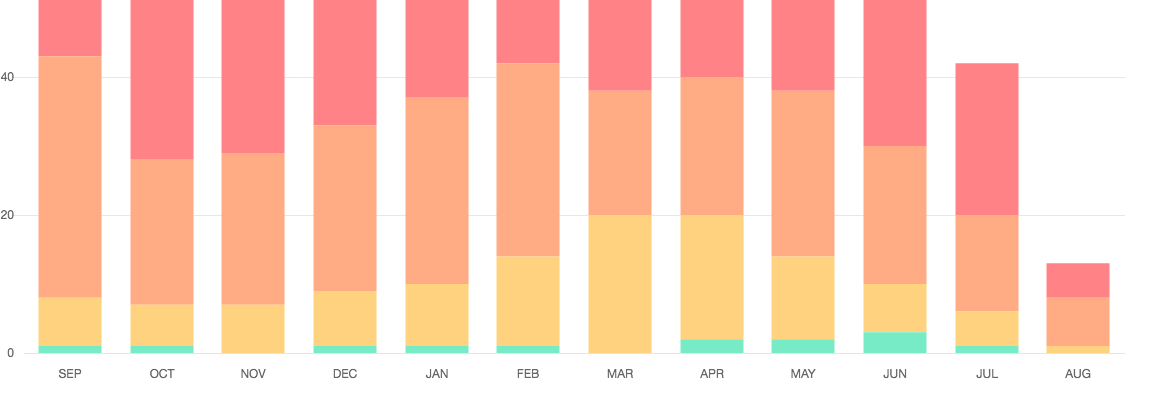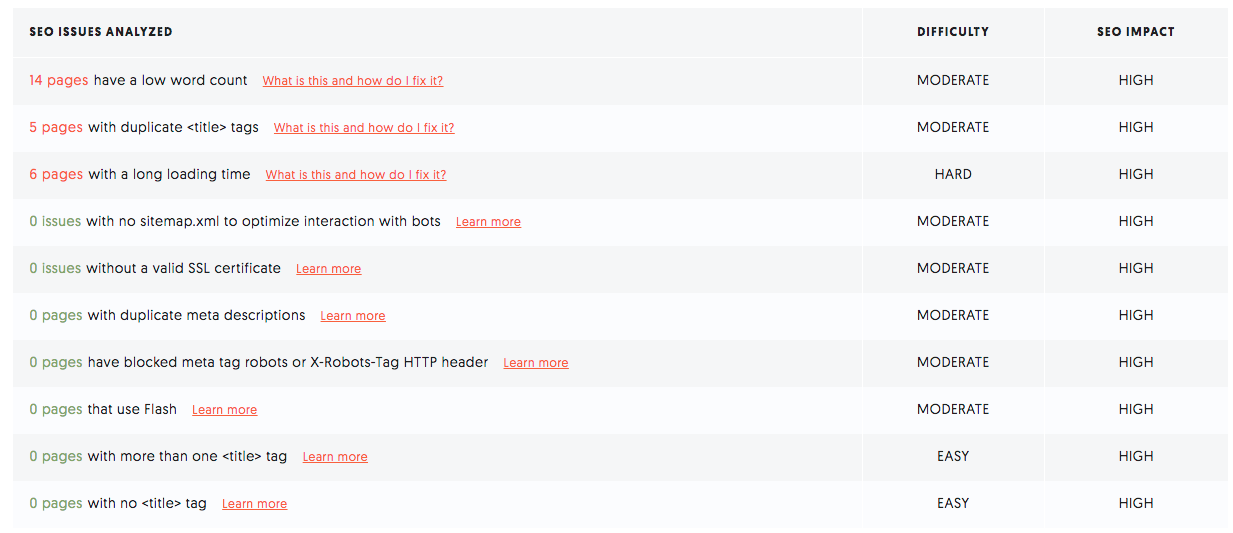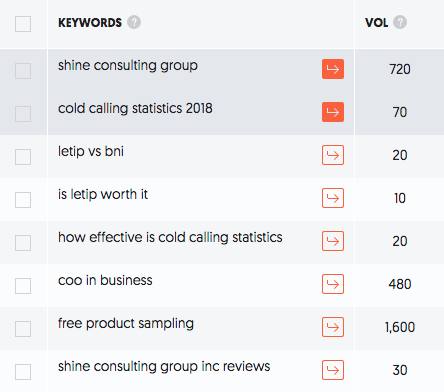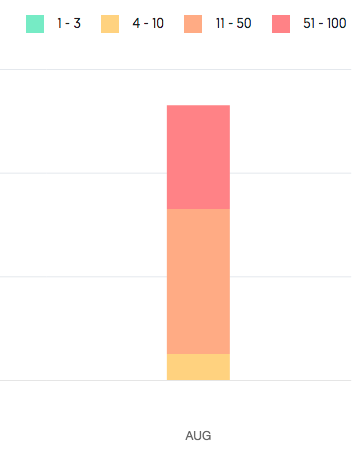Before you begin reading, go ahead and open up SEO Analyzer and enter your domain. We’re going to do an SEO Audit together. It will take 2-5 minutes so continue reading until we go back to review your results. This is going to work best from a desktop version of your web browser.
Having SEO is only effective if you can determine how well it’s working. That’s an SEO audit. A deep dive into the moving parts of SEO. Doing the audit is going to be much easier than you think. It’s correcting the diagnosed problems that are hard. Possibly very hard. But let’s cover the basics of how you can perform an SEO audit in a matter of minutes. Yes, about 5-10 minutes. It’s all thanks, of course, to the amazing Neil Patel. The world’s best and brightest SEO and content guru. Neil is my favorite marketer so I’m kind of a fangirl. I read his blogs, take his classes, and follow all of his content. I read about 400,000 words of education a week, yes, a week, to stay on top of my game.
SEO Audit – What is It?
An audit is nothing more than an investigation into something. In this case, your SEO is “something”. Auditing your SEO is how you know what things are impacting you the most, in both positive and negative ways. There are a TON of auditing tools out there. Most cost money for you to get an in-depth score. Some are very hard to decipher. I’ve used many tools over the years to monitor my own SEO as well as audit sites for clients.
There’s no reason to be afraid of an SEO Audit. Remember, it doesn’t mean it’s bad if you have room for improvement. You never want to be at the top of a game with no glass ceiling.
SEO Audit – How Do I Get My Score?
Your “score” is going to vary depending on what tool you use. How the information is delivered to you will also vary greatly. For this article, I had you use my favorite auditing tool. It’s easy to use and explains things in ways that beginners can understand. It isn’t a bunch of technical jargon. It also outlines the challenge level of each correction, the severity of the issue, and the impact it has on your SEO.
I also chose to use this tool most of the time because of how damned good it is. Neil is brilliant at what he does. He understands SEO as nobody else does. So his breakdown of the audit I find to be most helpful and most accurate.
It’s been about 4-5 minutes now, so go ahead and go back to see if your results are ready!
SEO Audit – How Do I Understand It?
I’m only going to walk you through the more critical areas. It’s easy to dig much deeper if you need to, or if your skill level is higher and you want to be more thorough. Keep in mind you will also need to leverage your own analytics from your site directly to get the best audit possible.
Site Audit – Section 1
Let’s look at what’s displayed here and break down each section further
On-Page SEO Score
This will display the overall total score of your site based on all of the criteria that was audited. 0-100 is the scale with 100 being perfect (I’m not sure that’s possible.) All of the details on the audit attribute to this score. Improving areas will make this score go higher. You can’t really get a ‘score’ on Google Analytics but you can look at the numbers to get a sense of levels of improvement over time. This is the best way to collect data on your audience as well.

Here are the analytics for the last 12 months on my site from Google. This is how I would ‘score’ my SEO using Analytics
Organic Monthly Traffic
This is an estimated number of organic traffic based on your top keywords for the last 30 days. If you click on this area, it will display those top keywords and pages for that time period. This is where you also need to pay attention to your analytics dashboard. I have about 8,000 users a year on my blogs. This tool is accounting for my most recent keywords and an estimated number of views. So this is a little more tricky. It’s also analyzing what keywords you are using that is very saturated with searches. This is NOT directly related to how many of them clicked your page.
Neil’s audit estimated 11 users per month. I had 59. So that means what I’m getting for my keywords are high per keyword. Google Analytics can’t tell you everything there is to know so using multiple tools is the best way to get an accurate read on how your SEO is doing.
Organic Keywords
This is the number of keywords that rank organically. I personally focus on quality over quantity so the number of keywords I have is actually quite low. If we look at the pages per session and bounce rate on Google Analytics, we can see those are good numbers. How 59 people came 109 times and viewed 570 pages. To really get accuracy, you need to look at both. But where Google fails on analyzing your top search results and your keyword strength, Neil does not.
What this is showing is where those 11 organic monthly traffic numbers came from. It chose these words because of how saturated they are. So it’s not how many hits you received from them, but how many times people looked up content over the last month that placed you on the first page.
This SEO Audit tool will also display the ranking of your keywords for each given month. So for my 53 keywords in August, it breaks down as follows:
- 5 in positions 4-10
- 28 in positions 11-50
- 20 in positions 51-100
Yes, these numbers can and do change often.
A friend of mine has 343 keywords with 212 ranking in positions 51-100.
Neil Patel has 636,363 keywords with 23,275 ranking in positions 1-4 and 56,702 in positions 4-10.
This means you need to continue to add content and focus on getting content pieces to be better and better in quality. This means making them more relevant, educational, and engaging.
I still own www.shineconsulting.biz along with .org and .net. They all forward here. I rebranded and chose to forward the domain instead of replacing it. So I lost SEO but I knew that going in. That site was live for 4 years (this one, about 6 months).

I’m still taking advantage of these keywords that are forwarding. Note the significant differences as I had higher rankings, including top spots.
Backlinks
This shows you where your incoming hyperlinks from other reputable sites are. This is a HUGE part of your SEO rankings. Backlinks equal authority so you want these numbers to be higher. Your Google Analytics won’t give you a good read on this although there are numerous backlink tools out there. This site doesn’t have many backlinks but my previous site does, although those do not forward, but I’m still taking advantage of the SEO there.
Health Check – Section 2
This is a recap of the things that are negatively affecting your SEO Audit scores. This doesn’t mean everything can be fixed or needs to be fixed. Here you need to review the critical things and determine what can be fixed, what can, and what shouldn’t. We’ll cover that in a later in section 4 here. By clicking on any parts of the Health Check fields, you’ll dig deeper. My recommendation is to do the issues in section 4 (Top SEO Issues) before you worry too much about the things in section 2. Save these for after you fix the most critical issues. Note that having these issues isn’t always a bad thing or a fixable thing, so please don’t think that way. Every site has SEO issues. You won’t get any details like this in Google Analytics or with most SEO tools.

Broken links will need to be addressed immediately. Critical issues are the ones worth investing in next. The Critical Errors page can be accessed by clicking it here or at the bottom of the SEO Analyzer in section 4.
Site Speed – Section 3
People often overlook the importance of the speed of your website. It’s a big part of your SEO audit and performance but Google analytics simply can’t help you here at all. Faster is better, always.
Website Speed also affects sales on top of your SEO. You can read more about it here.
Top SEO Issues – Section 4
This area will display critical issues that should be addressed first. Do not panic here! I’ll explain using my own issues why some of them can’t, or shouldn’t be changed. SEO is a game that can never be played perfectly.
What’s important to note is that your audit will asses the difficulty of correcting the issue, and the impact it’s having on your SEO. You cannot do this with Google Analytics or with a lot of SEO tools. There aren’t many SEO Audit programs that give you this kind of feedback either.
To help you understand how to evaluate your SEO audit issues, let’s dig into each one of my own to explain them and what can be done to fix them.
Low Word Count
In some cases, this is going to make sense. Remember, EVERY page on your website is used in an SEO audit. I’ll give you some examples of where most of these pages are on my site because you’ll likely have similar results on yours.
- If you break my blogs down by categories, there are only so many blogs on a page. So for Content / Copy category, page 3 has one listing. This makes this whole page too few words to rank well in SEO. But look at the page. Do you really want it to rank? Does it even make sense to rank?
- I have multiple pages with few words and a video embedded from YouTube. While some have plenty of words and SEO, others don’t really need it. Pages like this I didn’t really think were necessary to rank. Not every page individually needs to rank or be optimized.
Duplicate Title Tags
This might happen if you have blogs spread out over multiple pages. Since you aren’t optimizing SEO for each page of blogs, because that wouldn’t make sense anyway. I have 6 pages of blogs and each one has a duplicate title tag because I couldn’t efficiently optimize these pages.
Loading Time
These individual pages are loading slow enough that it’s dropping your total average time back, and it’s making these specific pages less effective. I’m in the process now of determining ways to speed my site up but considering I just rebuilt it…not so easy.

Here are other critical issues that could pop up. Although my site only has 3, I’ll cover what all of them are in case you have any on yours
No Sitemap.xml
This basically means the connection from this webpage to tell Google what is on this page is missing. The fix will be based on the platform you have and how it’s setup.
No SSL
Google now requires SSL or TSL certificates to rank properly. These are security protocols you can purchase from a domain provider, like GoDaddy. Your developer can install these on your site in about 15 minutes. It’ll take less than a day to activate.
Duplicate Meta Descriptions
Meta descriptions are the blurbs that appear under each site in a Google search result. If you have the same content for multiple pages, you’re going to confuse Google and drop your score. You never want any content or SEO data duplicated.
Blocked Meta Tag Robots
You could have pages that are blocked by search engines. If this appears you’ll need to have your web developer or SEO person investigate immediately.
Flash
Flash simply cannot be crawled on search engines so you should not be using Flash. Ever. Unless it’s on pages you do not want to rank. Landing pages should never have Flash unless the users are being sent there from sources other than search engines. Like a scanned QR code or a link in an email.
More than One Title Tag
You should never have more than one title tag per page or search engines can’t pick you up properly.
No Title Tag
Search engines prefer the use of title tags, so if you’re missing one you will drop behind users with one. Never skip a title tag but never use more than one.
_________
That was a LOT, I know. But being able to perform your own SEO audit is crucial if you are also doing your own SEO. Many small business owners have to do their own content and it’s hard enough to do, let alone know if it’s working. I think this is a great tool, especially for those learning in the earlier stages. If you need additional help, I’m always ready to listen! For more marketing madness, let’s connect on Facebook. If you have an SEO Auditing tool you prefer, I’d love to hear why you love it so much.








